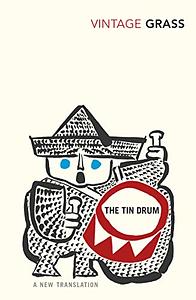Take a photo of a barcode or cover
I'm losing myself in snapshots of 'Strength Through Joy' tourists and testaments to tender 'Boy Scout' eroticism.
perhaps the only kind of post-war german literature which could have achieved commercial success
exculpatory / banal / funny / erotic. the Party Member of the family perceived, in retrospect, as a kind of jokester. hard to believe - yet perhaps that's how it really was/is.
agree in part with Murnane (A Million Windows), "the narrator is [...] abdicating his obligation to the reader"
but the narrator is not necessary - same for much of the plot we're sniffing through
I enjoyed the writing style from this author a lot. However, I hated--HATED--the psychopathic unreliable narrator, which makes it very hard to enjoy a book. The arrogance and lack of suffering throughout and after the war of this character seriously makes me wonder why this book set on the German side of WWII is lauded. I'll update after book club.
“If Apollo strove for harmony and Dionysus for intoxication and chaos, Oskar was a diminutive demigod who harmonized chaos and intoxicated reason with one advantage, in addition to his mortality, over all the gods recognized throughout the ages: Oskar could read what he pleased, whereas the gods censored themselves”
At first I didn’t know what to make of this book (still don’t to be honest). A child decides he doesn’t want to run his father’s shop so he stops growing at 3 in order to play on his toy tin drum for the rest of his days. Oh, and he’s growing up in 1930’s Germany and is an extremely unreliable narrator. This was a challenge at times but worth the effort imo, incredibly funny in spurts, and the “protagonist’s” general lack of empathy is both off-putting yet understandable as he truly feels alone in this world, never really able to find a home or a people to call his who last. Also he entices a statue of Jesus to play the drums and perform a miracle. Lots of stuff happens in this book. It rocks. And yes I will continue to read what I please suck it haters
At first I didn’t know what to make of this book (still don’t to be honest). A child decides he doesn’t want to run his father’s shop so he stops growing at 3 in order to play on his toy tin drum for the rest of his days. Oh, and he’s growing up in 1930’s Germany and is an extremely unreliable narrator. This was a challenge at times but worth the effort imo, incredibly funny in spurts, and the “protagonist’s” general lack of empathy is both off-putting yet understandable as he truly feels alone in this world, never really able to find a home or a people to call his who last. Also he entices a statue of Jesus to play the drums and perform a miracle. Lots of stuff happens in this book. It rocks. And yes I will continue to read what I please suck it haters
challenging
dark
reflective
slow-paced
Plot or Character Driven:
Character
Strong character development:
Complicated
Loveable characters:
No
Diverse cast of characters:
Complicated
Flaws of characters a main focus:
Yes
dark
funny
medium-paced
Plot or Character Driven:
Character
Strong character development:
Complicated
Loveable characters:
Complicated
Diverse cast of characters:
Complicated
Flaws of characters a main focus:
Yes
I'll hold off on a rating, since I only made it 36% through this.
I hoped I would like this, but every time I went to continue reading this book, I groaned inside. This has been one of the most boring, unnecessarily intricate and random books I've ever read. I find none of the characters remotely interesting, and the fact that each chapter reads like a distinct short story makes me wonder what plot exists here. I know there's a larger picture here - political statements and gross satire - but I just loathe the experience of reading this. The language is old (tons of rambling, tons of excessive detail, tons of the narrator talking just for himself), the main character is unsavory (psychotic little midget obsessed with drumming), the plot is incredibly boring (Just a bunch of anecdotes about a dysfunctional family, in no logical order other than chronological), and there is so much grossness in here that seems like it's just there for shock value (midget forced to drink piss, eels writhing through the mush in a dead horse's head, man committing suicide by skewering himself to a statue of a naked woman with his trousers down and a boner, etc).
Again, I wanted to like this. It's a Nobel Prize winner and supposedly praised as 'the greatest German novel written since the end of WW2,' but this just didn't work for me. :/
I hoped I would like this, but every time I went to continue reading this book, I groaned inside. This has been one of the most boring, unnecessarily intricate and random books I've ever read. I find none of the characters remotely interesting, and the fact that each chapter reads like a distinct short story makes me wonder what plot exists here. I know there's a larger picture here - political statements and gross satire - but I just loathe the experience of reading this. The language is old (tons of rambling, tons of excessive detail, tons of the narrator talking just for himself), the main character is unsavory (psychotic little midget obsessed with drumming), the plot is incredibly boring (Just a bunch of anecdotes about a dysfunctional family, in no logical order other than chronological), and there is so much grossness in here that seems like it's just there for shock value (midget forced to drink piss, eels writhing through the mush in a dead horse's head, man committing suicide by skewering himself to a statue of a naked woman with his trousers down and a boner, etc).
Again, I wanted to like this. It's a Nobel Prize winner and supposedly praised as 'the greatest German novel written since the end of WW2,' but this just didn't work for me. :/
challenging
dark
reflective
slow-paced
Plot or Character Driven:
A mix
Strong character development:
Yes
Loveable characters:
Complicated
Diverse cast of characters:
Yes
Flaws of characters a main focus:
Yes
Oskar’s the winner: in which Günter Grass lures the reader with an apparently simple tale of dwarfism, musical dysphoria, incest, Nazism, murder, Oedipal longings, and madness, before spinning into something far more complex. The “imitation of Christ” is also as near to the spawn of Satan a you can get this side of Rosemary’s Baby, and the plot, as such, resembles EastEnders at its most torrid. Breon Mitchell’s 2009 translation, undertaken with Grass’s direct involvement, conveys the rich musicality of the language, and the sprawling madness of the a story which is epic in its dimensions, quite ludicrous at times, and unputdownable, in the sense that you’d break a bone in your foot if you dropped it. The small scenes will linger, long after the whole has faded in the mind’s eye. It’s been an incredible journey and one which, if I’m honest, I’m happy is over, but Oskar the mad-not mad narrator, whilst he may be an unreliable witness, is alive alive-o...
I heard someone say once that they have a hundred page rule, where if they can make it 100 pages into a book and are still not enjoying it or getting anything from it they can put it down. I made it ~270 pages. What I read was fun, it’s a bizarre book with strange plot points, and it has some fascinatingly beautiful prose. It could have been interesting! But it’s just too long and there’s not enough happening to keep me coming back. It took too long to describe too little.
This meandering style could be good or bad depending on what you’re looking for. There were parts I was enamored with, but for the majority of the (long!) time it took me to read what I did, I felt like I was listening to someone who liked the sound of their own voice tell a very unimportant story.
This meandering style could be good or bad depending on what you’re looking for. There were parts I was enamored with, but for the majority of the (long!) time it took me to read what I did, I felt like I was listening to someone who liked the sound of their own voice tell a very unimportant story.


